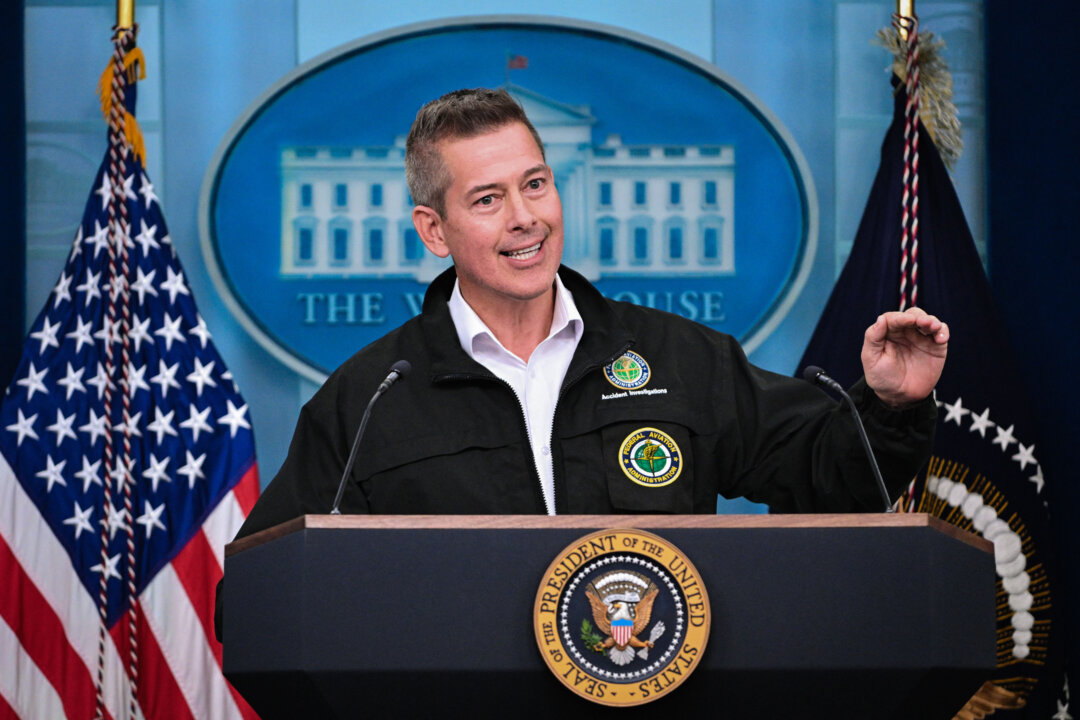The lawsuit, filed the same day as the federal government rescinded approval for the program, claims the government is breaking federal law.
New York’s Metropolitan Transportation Authority (MTA) sued the federal government on Feb. 19 for canceling a tolling program that the agency said was aimed at relieving traffic congestion in New York City.
Under the program, which debuted on Jan. 5, most passenger vehicles have to pay $9 at peak periods to enter the borough of Manhattan south of 60th Street. The toll for trucks and buses can be up to $21.60. The toll goes down by 75 percent in the evening.
The plaintiffs, the MTA and the Triborough Bridge and Tunnel Authority (TBTA), filed a legal complaint in federal district court against defendant Sean Duffy in his official capacity as secretary of the U.S. Department of Transportation (USDOT).
The other defendants are the Federal Highway Administration (FHWA), USDOT, and Gloria Shepherd, executive director of the FHWA.
The MTA describes itself as “North America’s largest transportation network,” which serves 15.3 million people in a 5,000-square-mile travel area around New York City. TBTA, also known as MTA Bridges and Tunnels, is an MTA-affiliated agency that operates toll bridges and tunnels in New York City.
The legal complaint was filed on Wednesday in the U.S. District Court for the Southern District of New York.
Earlier the same day, Duffy sent a letter to New York Gov. Kathy Hochul advising her that the FHWA was rescinding approval for what is formally known as the Central Business District Tolling Program. The FHWA and New York state and city officials signed an agreement on Nov. 21, 2024, authorizing the program.
Duffy wrote that the tolling program is at odds with the goal of keeping federally funded highways toll-free.
In his letter, he said President Donald Trump advised him that the tolling affects highways built with federal funds and imposes “significant burdens on the New York City residents, businesses, and area commuters … who regularly use the highway network in the [Central Business District] tolling area.”
New Jersey Gov. Phil Murphy also “expressed significant concerns” in a letter to Trump about the effect of the tolls on New Jersey residents and commuters, according to Duffy.
Duffy wrote that users of the local highway network “have already financed the construction and improvement of these highways through the payment of gas taxes and other taxes.” The tolling program leaves highway users “without any free highway alternative on which to travel within the relevant area,” and the funds raised under the program are being sent to the public “transit system as opposed to the highways,” he said.
“I do not believe that this is a fair deal,” the secretary added.
The plaintiffs asked the federal district court for a declaration that the decision to terminate the tolling agreement violates federal law. The agreement itself does not allow for its termination, according to the complaint.
The plaintiffs said the tolling program is needed because the Central Business District in Manhattan “is one of the most congested urban areas in the country, where travel times had been extraordinarily slow for decades.”
This congestion “has been a $20 billion annual drag on the regional economy, and thus the national economy, as well,” the complaint said, noting preliminary data from last month indicating the program “is working.”
The defendants also “provided no basis for FHWA’s abrupt reversal of its position on the Program,” the complaint said.
In his letter, Duffy said the tolls imposed under the project appeared to be driven primarily by the need to raise revenue for the MTA rather than to reduce congestion.
Allowing the federal government to terminate the program “would create uncertainty around the future of such programs any time leadership at FHWA, USDOT, or the White House changed—uncertainty that may make it difficult to issue bonds for other projects,” the complaint said.
After learning of Duffy’s letter, Hochul said at a press conference that the decision to upend the tolling program was “an attack on our sovereign identity, our independence from Washington.”
She said the tolling program is a success and that the funds raised from it back $15 billion in debt for mass transit projects.
The Epoch Times reached out for comment to the U.S. Department of Justice, which represents Duffy and the other defendants, and the New York City law firm of Kaplan Martin, which represents the plaintiffs.
No replies were received by publication time.
Reuters and Chase Smith contributed to this report.

